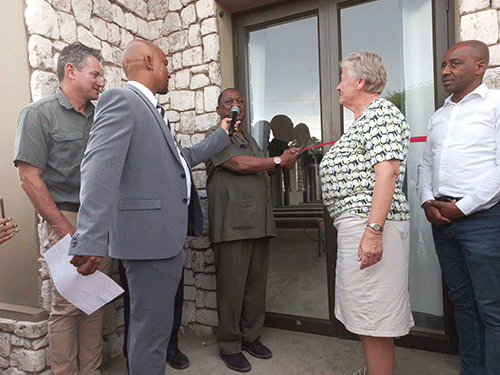Julia Kamarenga
The N/a’an ku sê Life Line Clinic in the Epukiro constituency recently expanded its operations when it opened a school and a church at the clinic facility.
The school will have grades one to four and about 10 learners only in each class.
In his keynote address, the Minister of Health and Social Services, Dr Kalumbi Shangula, said a need for proper planning has been realised to ensure that public health such as healthcare, education, potable water and electricity are available to communities, and that is why the government has consistently and continuously allocated the biggest portion of the national budget and other resources to the social sector.
The minister said although the government has been able to provide, expand and improve the provision of these services, it has not been able to cater for all the community needs, hence the call and invitation to the private sector to complement and contribute to its efforts to cater for all community needs and reach more people with critical services.
He echoed that the government has, therefore, taken deliberate steps to engage the private sector and form durable partnerships for better service delivery.
Shangula also referred to a similar gesture by the Catherine Bullen Foundation, which recently donated an equipped ambulance to the Otjimanangombe clinic to promptly and effectively serve the Otjimanangombe population and the surrounding areas.
Manager of the N/a’an ku sê Foundation, Hardus Swart said the foundation has the interest of the San people and is determined to change their livelihoods by bringing education closer to them, health facilities, housing and water.
The opening of the school is highly appreciated not only by the residents of the constituency, including the San people but the entire region as it serves as a beacon of hope, especially in laying a strong foundation and retaining the San children in school thus contributing to their development.
The N/a’an ku sê Foundation has partnered with the government in providing healthcare services, in particular with addressing gaps in the treatment of tuberculosis, especially among the marginalised San community.
The foundation also feeds up to 120 people as a means of fighting malnutrition, a condition that affects cognitive development in children and causes various ailments.
Another addition to the facility is a vegetable garden to supplement the feeding programme, with hydroponic and agricultural techniques simultaneously providing future training and job opportunities.
The clinic initiative was prompted by the death of a San baby in 2003 and to date, more than 4 000 people are assisted monthly at the clinic while over 90% of patients treated are San.


